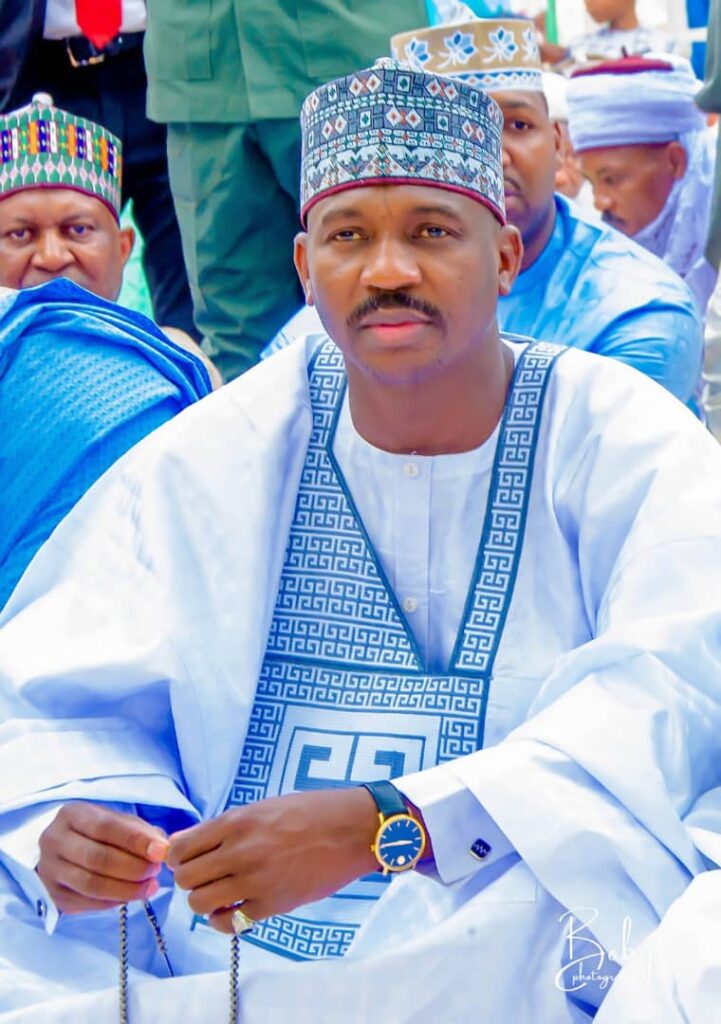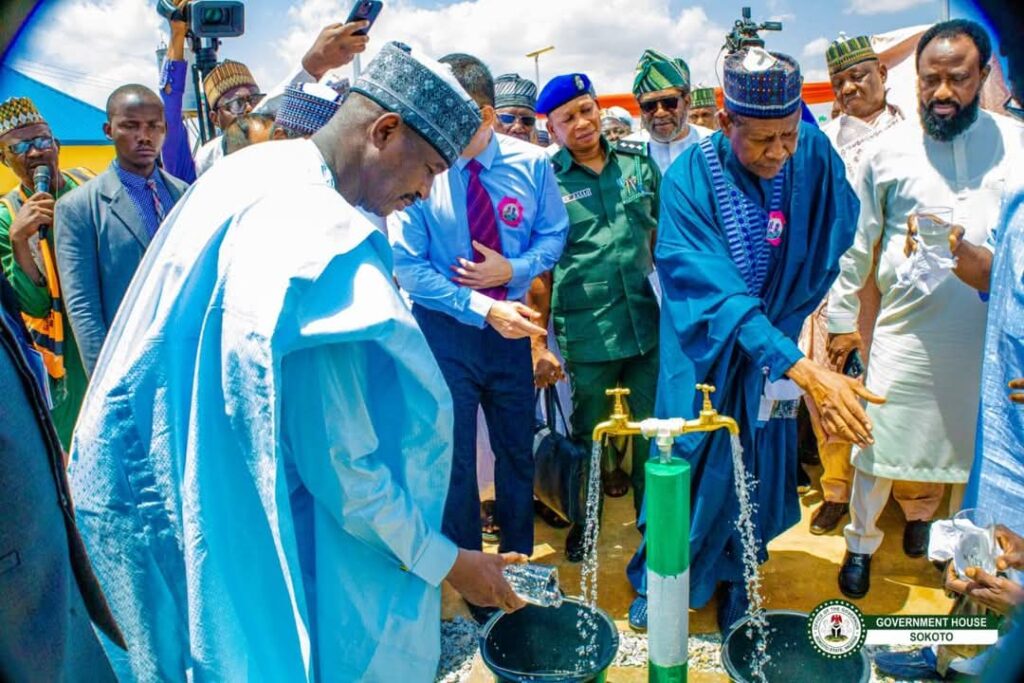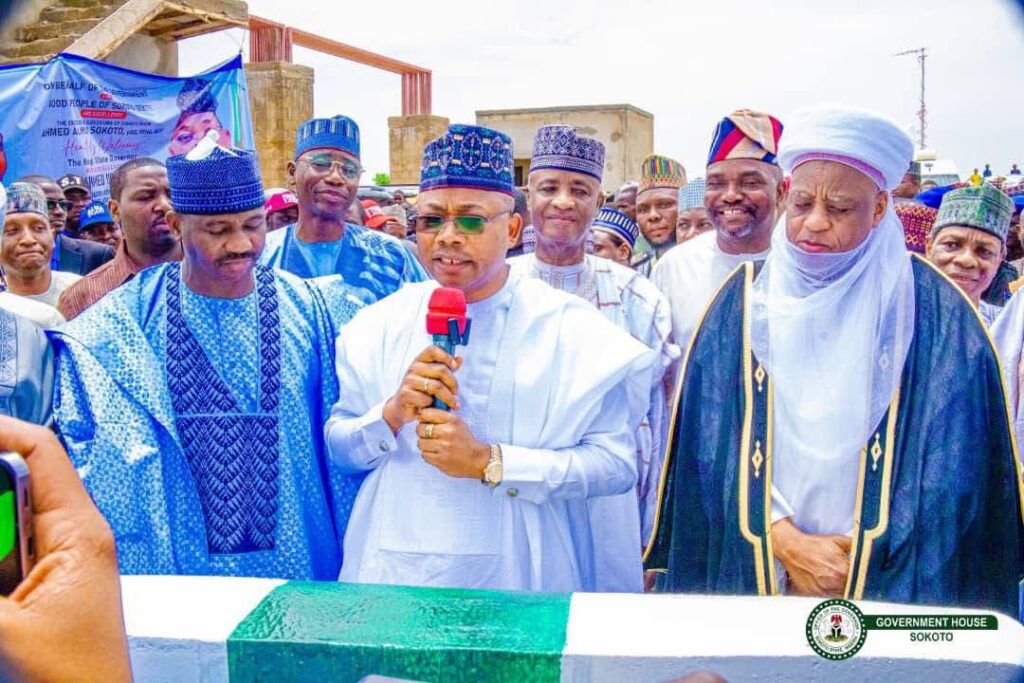
By Mohammed Bwago
In the heart of northwestern Nigeria, Sokoto State has been undergoing a quiet but impactful revolution in the last 27 months. Often overshadowed by national politics and regional complexities, the state is now commanding attention for the sweeping reforms and development projects initiated under Governor Ahmad Aliyu.
The 9-Point transformative agenda being implemented by Governor Ahmad Aliyu has been holistic, but in this article, I intend to be beam the searchlight on four critical sectors that are most directly improving the quality of life of the good people of Sokoto state: health, water, housing, and religious affairs.
The Governor Sokoto revolution is not merely a cosmetic change in policy or administration, it is a profound shift in governance, prioritizing human dignity, sustainable development, and inclusive growth.
Health, the foundation of human capital development, has received a new lease of life in Sokoto state. For decades, inadequate infrastructure, shortage of medical personnel, and lack of equipment plagued the health system. Today, a different story is unfolding.The state government has undertaken an aggressive renovation and equipping of the general hospitals across the 23 local government areas. Key health facilities such as the Sokoto Specialist Hospital and the Women and Children Hospital have equally been refurbished and modern diagnostic equipment, previously only accessible in only major hospitals installed, thus saving lives, cutting down on referral from rural hospitals and transportation costs for patients.
Additionally, Primary Health Care (PHC) centers have received increased attention, with over 100 PHCs upgraded in rural communities. These centers are now better equipped to handle maternal and child health, immunizations, and common illnesses. It’s no wonder Sokoto State has recorded impressive results in immunization rates.
One of the most applauded initiatives is the Health Worker Recruitment and Incentive Programme through which hundreds of nurses, midwives, doctors, and community health workers have been recruited and posted to underserved areas. The programme also provides rural health workers with accommodation, allowances and hazard pay, a move that has significantly reduced attrition.
As part of his twin strategy of – preventive and curative care, the government has launched health education campaigns focusing on hygiene, nutrition, and disease prevention, significantly increasing community participation and awareness.
Another important revolution is in the water and sanitation sector, which is somewhat related to health. For decades, water scarcity remained a persistent challenge in most parts of Sokoto state. Former governor Aliyu Magatakarda Wamakko had taken steps to address the problem,but the efforts were thwarted by Aminu Tambuwal who abandoned the various projects.
The Ahmad Aliyu Sokoto administration has since taken bold steps to address this issue through a series of integrated water projects that target urban, semi-urban, and rural areas. The Sokoto Urban Water Supply Expansion Project, for instance, has increased the water supply capacity to the state capital and surrounding towns by over 50 percent in two years. This was achieved through the rehabilitation of major treatment plants, laying of new water mains, and installation of solar-powered boreholes in critical locations.
Recently two water projects were completed,while four are being aggressively constructed because the governor is determined to make water supply crisis a thing of the past.

In rural Sokoto, where the burden of fetching water disproportionately affects women and children, the state government has drilled over 1,500 motorized and solar-powered boreholes. These projects are not just about access, they are also about sustainability. Communities are now trained to manage and maintain their local water systems through the Water Sanitation and Hygiene Committees (WASHCOMs).
Furthermore, the Ministry of Water Resources has partnered with international donors and NGOs to deliver climate resilient water infrastructure that ensures long-term functionality. Water quality monitoring has also improved, reducing the incidence of waterborne diseases and improving overall public health. Unlike the Aminu Tambuwal era when untreated water was pumped the present administration has heavily invested in the purchase of chemicals for the water corporation.
Another critical component of Sokoto’s development agenda is affordable housing. Recognizing that decent shelter is essential for dignity and security, the government has launched multiple housing schemes aimed at civil servants, low-income earners, and displaced persons.
The Sokoto Affordable Housing Initiative has seen the construction of over 1,837 housing units across the state, with a particular focus on strategic urban centres. These housing estates are not just concrete blocks; they are thoughtfully designed communities complete with roads, water systems, electricity, schools, and health posts.
Additionally, under a Public-Private Partnership (PPP) Housing Scheme, the state has attracted investment from real estate developers who are working hand-in-hand with the government to provide mid-range housing for the growing middle class.
A particularly laudable effort is the resettlement housing project for communities affected by flooding and insecurity. These new homes are built with climate resilience in mind and come with integrated social services, including skill acquisition centres, markets, and places of worship.
Land title reforms and digitization of land registry processes have further boosted citizens’ ability to own homes legally and affordably, reducing the bureaucratic bottlenecks that used to hamper access to housing.
Away from the brick and mortar projects, religion no doubt plays an integral role in the lives of the people of Sokoto, the seat of the Caliphate, a spiritual beacon for millions of Muslims across Nigeria and West Africa. Under the administration of Governor Ahmad Aliyu, religious affairs have gone beyond symbolism to playing a role in education, conflict resolution, and social cohesion.
Through the Ministry of Religious Affairs, the government has increased support for Islamiyya and Qur’anic schools, providing instructional materials, grants, and infrastructure. A notable innovation is the integration of Western education into some of these schools, ensuring students receive a balanced and modern education that respects religious values.
The annual Hajj operations have also witnessed marked improvements. Through better logistics, biometric registration, and pilgrim welfare programs, Sokoto State now boasts one of the most organized and reputable Hajj preparations in the country.
The state has also increased the budgetary allocation for the maintenance of mosques, promotion of interfaith dialogue, and the training of religious leaders. By supporting clerics through structured programs, the government aims to tackle religious extremism and promote messages of peace, tolerance, and development.
The rehabilitation of historic religious sites and support for traditional institutions have also helped to preserve the rich Islamic and cultural heritage of the Caliphate while aligning with contemporary governance ideals.
What sets this revolution apart is not just the brick and mortar projects, but the intentional inclusion of people in development. From community health workers to local water technicians, and from mosque committees to housing cooperatives, citizens are not just beneficiaries, they are partners.

Sokoto’s transformation in health, water, housing, and religious affairs is not just a tale of government performance; it is a story of leadership with vision, commitment, and empathy.
As the state navigates the future with hope and purpose, the results already visible on the ground show that with the right priorities and people-cantered policies, even the most daunting challenges can be overcome.
For Sokoto State, the revolution is not coming, it is already here. And its echoes are being felt in every household, hospital ward, water pump, housing estate, and prayer ground across the Caliphate.

Join the Conversation